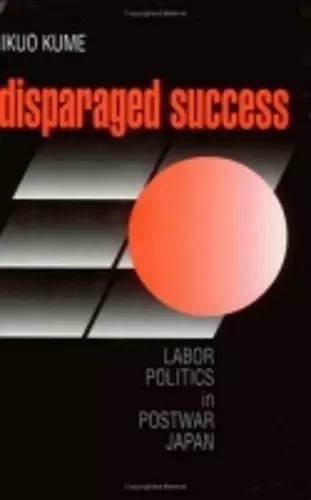Disparaged Success
Labor Politics in Postwar Japan
Format:Hardback
Publisher:Cornell University Press
Published:9th Feb '98
Currently unavailable, and unfortunately no date known when it will be back
This hardback is available in another edition too:
- Paperback£37.00(9780801484940)

Japanese scholars have begun to challenge conventional wisdom about effective labor organizing, and Ikuo Kume has written the first book in English to advance their controversial theory. Since at least the early 1980s, the power of organized labor has weakened in most advanced industrial countries. The decline of organized labor has coincided with the decentralization of labor-management relations. As a result, most observers assume that decentralized labor is destined to lose power in a capitalist economy, and that enterprise unions will tend to be docile and powerless.Kume documents the one notable exception. The Japanese trade union confederation has steadily grown in importance, expanding its scope beyond individual companies to national policy making. Kume traces the achievements of enterprise unionism in private firms. Labor, he argues, slowly gained legitimate corporate membership by establishing joint institutions with management. By the 1960s, labor-management councils, stimulated by foreign competition, had become a widespread feature of Japanese industry. Soon unions were regular participants in the government deliberation councils and in the information exchange that shaped policy when inflation hit the Japanese economy. The unions had become a full partner by the 1980s and were crucially involved in the 1993 defeat of the Liberal Democratic Party after thirty-eight years of rule.
Disparaged Success is one of the few English-written books that comprehensively examines the postwar development of labor politics and industrial relations, and this makes the book highly valuable. Kume's book is also important in that it is one of the first attempts to explain labor politics in Japan from an explicitly comparative perspective, putting the Japanese case in the context of analytic frameworks used by studies of labor politics in other industrialized countries.
-- Akira Suzuki, Hosei University * Journal of Asian Studies *Ikuo Kume presents a detailed and omplex analysis of why labor unions in Japan are an anomaly among industrialized economies. Japanese labor unions are enterprise-based and structurally highly decentralized. Yet unions in Japan have gained in importance and imfluence since the 1960's. Union leaders continue to influence corporate and national labor policy even though Japan, similar to other industralized societies, is undergoing a conservative swing as well as a decade-old economic crisis.... Kume uses a framework that is based on the concept of political opportunity as unions became incorporated into government-management coalitions through the development of social networks that seek cooperation rather than confrontation.... Thoughtful.... Analytic.
-- Jon P. Alston, Texas A&M University * Journal of Asian Business *Ikuo Kume's Disparaged Success offers a fresh view.... His revisionist argument sounds fascinating and encouraging. It is indeed refreshing to hear such applause for the Japanese model from today's standpoint. Yet the book is not obsolete even under the much changed economic conditions of today, and it stands as a benchmark in the study of Japanese labor politics.... The book promises to fuel a controversial debate on equality, fairness and the quality of Japanese lives. This classic issue has contemporary relevance, given rising unemployment rates and the problem of labor redundancy.
* Social Science Japan Journal *An extremely interesting book.... Kume makes an important point about the ability of Japan's culture and political economy to incorporate and accommodate distinct interest groups to minimize and routinize conflict and achieve ongoing consensus.
* Choice *Provides a comprehensive articulation of the liberal interpretation of postwar labor-management accommodation in Japan.
* H-Net Reviews *This book is useful as an introduction into the complex development of the Japanese trade union movement and for its debunking of the myth that the Japanese working class is an unorganized, powerless class.
* MARXIST ReviISBN: 9780801433641
Dimensions: 235mm x 155mm x 22mm
Weight: 907g
256 pages